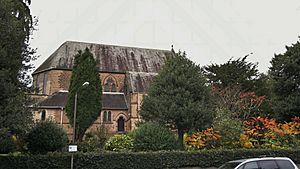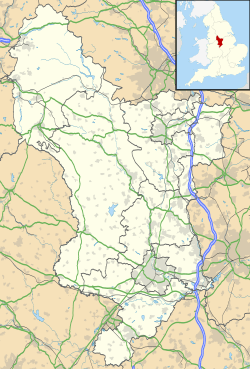All Saints' Church, Matlock Bank facts for kids
Quick facts for kids All Saints’ Church, Matlock Bank |
|
|---|---|

All Saints’ Church, Matlock Bank
|
|
| 53°08′37.3″N 1°33′19″W / 53.143694°N 1.55528°W | |
| Location | Matlock, Derbyshire |
| Country | England |
| Denomination | Church of England |
| Website | allsaintsmatlock.org.uk |
| History | |
| Dedication | All Saints |
| Consecrated | 17 September 1884 |
| Architecture | |
| Heritage designation | Grade II listed |
| Architect(s) | Thomas Henry Healey |
| Groundbreaking | 31 August 1882 |
| Completed | 15 April 1884 |
| Administration | |
| Parish | Matlock |
| Deanery | Carsington |
| Archdeaconry | Chesterfield |
| Diocese | Derby |
| Province | Canterbury |
All Saints' Church in Matlock Bank is a special old church in Matlock, Derbyshire. It's a 'Grade II listed' building, which means it's important and protected because of its history and architecture. It belongs to the Church of England.
Contents
The Church's Story
The story of All Saints' Church began with a smaller building. A mission room and school was designed by Mr. Skedward from Sheffield. It opened on August 17, 1875. Captain Augustus Arkwright, a Member of Parliament, helped open it.
Soon, the mission room was too small for everyone. People started raising money to build a new, bigger church. The first stone for the new church was laid on August 31, 1882. Mr. F.C. Arkwright, from Willersley Castle, laid the stone. The Bishop of Lichfield was also there for this important event. The church was designed by an architect named Thomas Henry Healey from Bradford.
The new church officially opened on April 15, 1884. The Bishop of Lichfield led the opening ceremony. Later, on September 17, 1884, the Bishop of Southwell, George Ridding, formally made the church sacred.
The original plan was to build a much larger church. However, only the main part (the chancel) and some of the nave (where people sit) were finished. A front section was added to the west side of the church in 1958.
Secret Tunnel at the Church
There's an old secret tunnel, sometimes called a 'priest hole', connected to the church. It used to run from the church to the nearby Infant's School. From there, it continued to the site of the Junior School. Parts of this tunnel are still there today. However, much of the tunnel between the church and the Infant School cannot be used anymore.
The tunnel was carved right out of the sandstone rock. It was lit by gas lights in the past. The tunnel is about 4 feet (1.2 meters) high and 2 feet (0.6 meters) wide. Only smaller people can fit through it easily.
Beautiful Stained Glass Windows
All Saints' Church is famous for its amazing stained glass windows. The large window at the east end of the church was designed in 1905. It was created by a very famous artist named Edward Burne-Jones. There are also beautiful windows along the north side of the church. These were made in 1907 by a company called Heaton, Butler and Bayne.
Church Community
All Saints' Church is part of a larger church community. It shares a parish with another church:
The Church Organ
The church has a wonderful pipe organ. It was built by a company called Forster and Andrews. The organ was first played on December 15, 1886. Thomas Barker Mellor, who was the organist at All Saints' Church, Bakewell, played it for the opening. You can find more details about this organ on the National Pipe Organ Register.
Past Organists
- John Goddard Barker was the organist from 1889 to 1892. He had been the organist at Holy Trinity Church, Matlock Bath before coming to All Saints'. After his time here, he became the organist at All Saints' Church, Ashover.
More to Explore
- Listed buildings in Matlock Town
 | Lonnie Johnson |
 | Granville Woods |
 | Lewis Howard Latimer |
 | James West |


